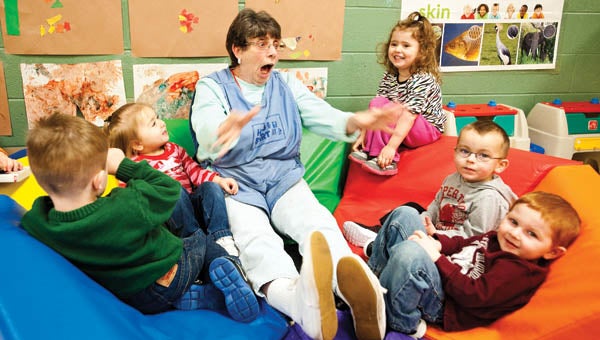PROFILE 2013: Joy of learning
Published 9:25 am Monday, February 25, 2013
It was only 6-week-old Kynnedi’s second day in infant childcare at the Ohio University Southern Child Development Center, but parents Elizabeth and Jack Stevens knew she was in good hands.
The Stevens family has been part of the Lawrence County Early Childhood Academy family since their oldest daughter, Lynndan, was 5 month old.
Now 20 months old, Lynndan is thriving, the couple said, both intellectually and socially. She used to be a shy, clingy baby, Elizabeth said, but now is friendly and outgoing.
“Everyone just brags on how smart she is,” Elizabeth said. “She has done wonderful.”
The Stevenses are young parents; Elizabeth, 25, and Jack, 22. When they were expecting Lynndan, both were students at Ohio University Southern and also worked there.
“How are we going to do everything?” Elizabeth said, recalling the couple’s thought process before their baby was born.
“It definitely hits you with a moment of shock,” Jack said.
The couple from Ashland, Ky., had family support for awhile after Lynndan was born, but eventually needed a more reliable and structured environment for the baby.
The couple heard of the childcare option through the LCECA and did some research on some other local daycares.
“We actually looked at other daycares initially, just to see what was available and this was one of the only daycares that actually had a curriculum for small children,” Elizabeth said.
And the curriculum in the LCECA centers is what sets them apart, said director Sharon Daniels.
From developing fine motor skills and dramatic play, to science, math and writing, children who attend LCECA centers are given a head start on their way to kindergarten.
“Nationwide, there is a higher expectation of Head Start programs to ensure preschool children are ready for kindergarten,” Daniels said.
What is LCECA?
The LCECA is a non-profit organization that provides comprehensive early childhood services through a variety of programs at 11 sites throughout the county.
Funded through federal grants, childcare subsidies, private contracts with school districts and some private-paying families, LCECA runs Head Start, Early Head Start, Early Childhood Education, Help Me Grow and year-round childcare. Overall, the agency serves about 840 children and their families.
And no matter which program a child is in, Daniels said they all receive the same quality of services and learning.
“We are targeting families that can benefit from having child care while they work, go to school and, sometimes, they just need their child to get a quality preschool education,” Daniels said.
The OUS center in Hanging Rock fulfills that need for the Stevens family, as well as other parents who are juggling their lives and the lives of their little ones.
“Our target is students, so we can take care of their children while they get an education,” Daniels said.”
Childcare is also offered at sites in Proctorville and South Point and is available for infants and children up to 5 years old to families all over the Tri-State.
The LCECA is unlike most daycare centers in that children do not just go there to play until their parents pick them up. Those children in the childcare classrooms follow a curriculum, just like the students enrolled in Early Childhood Education programs.
“They all receive the same quality of services,” Daniels said. “All the classrooms are equipped in the same manner.”
All teachers have at least a bachelor’s degree in early childhood education and classrooms are equipped with computer areas with age-appropriate software. Some have smart boards and more recently, iPad Minis.
“We are trying to keep up with the modern technology so when children go to kindergarten, they have all these experiences and opportunities that maybe some of the more disadvantaged children might not have experienced if they had not come to our program,” Daniels said.
The technology also extends to the parents. Using the iPad Minis, teachers can send parents notes or pictures of their child’s progress.
“Parents can be working or going to school and receive this neat thing about their child and I just think it’s so cool,” Daniels said.
“They can get a picture of their baby playing with another baby or reading a story.”
In addition to technology areas, the classrooms are divided into several other areas devoted to fine motor skills, music, math, science, dramatic play, art, writing and, of course, reading.
“They are not just playing, although play is important, but we make sure the environment is set up to be conducive to their learning,” Daniels said.
And to ensure the children will be fully prepared for kindergarten when they leave the LCECA programs, a leadership team meets with each of the county’s school districts to know what is expected of the children.
“They let us know what’s expected of their kindergartners from our children,” Daniels said. “So when our kids transition in the kindergarten, we have those readiness skills, and that’s what we are teaching the children.”
Although learning is key, the LCECA doesn’t stop with academics.
The centers require all children to have dental exams and medical checkups, as well as keep up with blood screenings, height and weight, immunizations and nutrition.
The LCECA also works closely with the director of the WIC clinic to approve all school breakfast and lunch menus to ensure they are nutritious.
There is also a registered nurse on staff to monitor health services and identify areas to follow up on.
For infants with special needs, a full-time staff member with experience in infant mental health can ensure those children are evaluated early on.
Single mother Dusti Crabtree has two children attending the OUS Child Development Center and one on the waiting list. Her oldest daughter, Jay-Leigh, now 10, also went through the program.
Crabtree said she benefited from have the LCECA involved in her children’s lives from infancy.
Her 3-year-old, Ellie, was found to have some developmental disabilities, but is being treated at the center with physical and speech therapy.
Ellie is doing well.
“There is someone from the main center who comes and helps her work through those delays, which is so nice,” Crabtree said. “Had she been at home, or just in a regular daycare, I might not have known.”
Even right after birth, the LCECA is notified from area hospitals, through Baby Net, if infants are born with special needs.
“We’ll assign a service coordinator to make a home visit and see what we can do to hook them up with an individual family service plan,” Daniels said. “That child might then receive physical therapy, speech therapy, occupational therapy, any number of auxiliary services that that child needs as an infant.”
For older children, aides from the Lawrence County Board of Developmental Disabilities assist with special needs children in the classroom.
Learning as a family
As much as the LCECA prepares children for kindergarten, it also teaches adults how to teach their children and prepares them for parenthood.
Mothers can enroll while they are pregnant in the Early Head Start and Help Me Grow programs and begin a prenatal curriculum.
The curriculum goes week by week throughout the pregnancy so mothers can learn about breast-feeding, nutrition, weight gain, delivery and what to expect throughout the pregnancy. Moms also have get-togethers to socialize and make crafts for their babies.
“As soon as they deliver, our nurse makes a home visit within 10 days of the baby’s birth, to see if mom is doing OK, if the baby is doing OK,” Daniels said.
From then on, a home visit is made once a week for 90 minutes until the child is 4 years old and ready to be transitioned into one of the center-based programs, like Early Childhood Education.
The caseworkers who visit the homes also have degrees in early childhood education but are not making home visits to teach the children.
“Our goal is to teach the parents what is appropriate, what to teach, what is the best practice for a healthy life,” Daniels said.
The programs are not all about the mothers, and fathers are strongly encouraged to take an active role in the home visits as well as the activities at the center-based programs.
Daniels said some children have fathers who are incarcerated, but with the mother’s permission, children can send art and school work to their fathers.
“It’s a way to let dad know, you’re still a dad even though you’re incarcerated,” Daniels said. “It’s still important the child knows dad is out there somewhere.”
If the child’s father is not involved, Daniels said a strong male role model is encouraged to participate.
The LCECA also connects families with community services if needed, such as referrals to the Workforce Development Center to learn about getting a GED or a college education, or finding doctors, housing or even something as small as getting a smoke detector for the home.
“We try to look at the whole child, meaning that child lives within the context of a family,” Daniels said. “And the family lives in a community. So we believe it takes the whole village to raise a child. We do not want the parents to be dependent on us. We want them to be self-sufficient.”
Assurance
Both the Stevens family and Crabtree said the services at the LCECA give their children structure and give them reassurance that their children will be well taken care of.
“It does help bring stability, having structure and a schedule,” Elizabeth Stevens said. “It’s something you can depend on. They are always reliable.”
Crabtree agreed.
“Especially if you are a working mother, it’s nice to know the people you are leaving your child with you are comfortable with. Everyone here is like a second family to me and my kids. Of course they have been here since birth practically. They know them, but you know when you leave your child here they are going to be taken care of. They are going to learn.”






